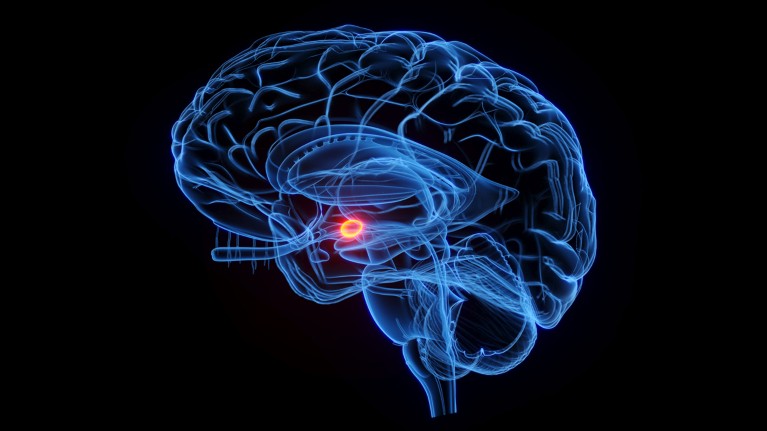
The vagus nerve connects the brain region called the amygdala (red; artist’s illustration) to nerves for Brunner’s glands in the gut.Credit: Sebastian Kaulitzki/Science Photo Library
Stress can cause illness and gut bacteria could be to blame, according to a study1 in mice. The research suggests that a stressed brain directly shuts down certain glands in the gut, which affects gut bacteria and the body’s wider immune system.
The study “is a technical journey,” says neuroscientist John Cryan of University College Cork in Ireland, who reviewed the study. Most work on the gut-brain connection has focused on how bacteria affect the brain, so Cryan welcomes research into how psychological states can exert “top-down” control over bacteria. “That’s a really cool piece of the puzzle,” he says. The study was published on August 8 last Cell.
Gut-brain chat
Scientists have long known that the gut and brain “talk” to each other. During stress, the brain stimulates the release of hormones that can trigger intestinal diseases such as inflammatory diseases. And certain bacteria in the gut can release chemical signals that affect the brain and behavior.

Your brain may be controlling how sick you get—and how you get better
But neural communication pathways are less well known. To find out more, neuroscientist Ivan de Araujo at the Max Planck Institute for Biological Cybernetics in Tübingen, Germany, and his colleagues focused on small organs called Brunner’s glands found in the walls of the small intestine. Little is known about these glands, other than that they produce mucus and contain numerous nerve cells.
De Araujo’s team found that removing the Brunner glands of mice made the animals more susceptible to infection. It also raised signs of inflammation, a flood of immune chemicals and cells that can damage tissue. The team saw a similar effect in humans: people who had tumors removed from the part of their intestines containing Brunner’s glands had higher levels of white blood cells – a marker of inflammation – than people who had tumors removed from other areas.
Housekeeping bacteria
Further analysis showed that removing Brunner’s glands from mice eliminated bacteria in the Lactobacillus a genus that lives in the small intestine. In a healthy digestive tract, Lactobacilli stimulate the production of proteins that act as a joint between the cells that line the intestines, keeping most of the contents of the intestines inside while allowing certain nutrients to enter the bloodstream. But when? Lactobacilli are gone, the intestines become “leaky” and “things that shouldn’t go into the blood do,” says de Araujo. The immune system attacks these foreign molecules, causing the inflammation and illness seen in mice without Brunner’s glands.
The researchers then studied the neurons of the glands. They found that the neurons connect to fibers in the vagus nerve, which is the communication channel between the gut and the brain. These fibers go directly to the brain’s amygdala, which is involved in emotions and stress responses.
Subjecting mice with complete Brunner glands to chronic stress had the same effect as removing the glands: Lactobacillus levels decreased and inflammation increased. This indicated that stress had shut down the Brunner glands.
Communication channels
Asya Rolls, a neuroimmunologist at the Technion — Israel Institute of Technology in Haifa, is fascinated by the direct link between the brain, Brunner’s glands, bacteria and the immune system. “The specificity of the connection is amazing,” she says. But she cautions that the pathways in mice may not be the same as in humans.
“This paper is quite encouraging,” says Christoph Thaiss, a microbiologist and neuroscientist at the University of Pennsylvania in Philadelphia. Understanding the specific pathways connecting the brain and gut, he says, could help researchers study questions like why some people are more resilient to stress than others.
De Araujo says the research could have implications for the treatment of stress-related disorders such as inflammatory bowel disease. His group is now investigating whether chronic stress affects this pathway in infants, who are exposed to it Lactobacillus through the mother’s milk. “We are excited by the idea that these glands are important for normal development and immune function early in life,” says de Araujo.
#stressed #brain #weaken #immune #system